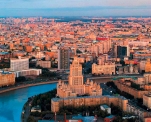The Great Moscow – Opting Algorithm

The swiftly decision to expand Moscow area has set so many problems that to solve them are hardly under the force even several design institutes. Nevertheless, the ten design teams that have already dubbed the brave have already started to develop their own concepts of “The Great Moscow”. The International Academy of Architecture professor Andrei Chernikhov’s team includes planners and urbanists from Russia, USA, Croatia, Bulgaria, Denmark and the UK. The Head of “Architecture and design studio of A.A. Chernikhov” described to our reporter what kind of problems they face and how they evaluate their scale.
Andrei Aleksandrovich, The Foundation n. a. Iakov Chernikhov, which president you are, awards the young architects with “The challenge of time” reward. And what challenges are answered by the developers of the “Big Moscow” concept?
Time is the notion of ambivalence, and the question is who initiates this challenge: the artist pushes the time or the time calls for those he meets its demands. All the mega-cities characterized by the same “generic features”: overpopulation, traffic problems, poor environment, the atomization of social life and social dislocation, the ghetto and the problems of migrants, corruption ... But at the same time, the modern metropolis - is a high concentration of human capital, finance, energy, creativity, high technology, a large number of brands, etc.
If we talk specifically about Moscow and the Moscow region, it is quite clear that the system approaches a state of collapse and no longer able to meet the needs of people living here. Practically, it is faltering in all the subsystems - transport, overpopulation, migration, environment... And the first thing to recognize: capitalizing on maximum land lease and trade (that used to be the salutary scheme for Moscow of 90s - is the way to nowhere. And the second is to assume that in our time, rigid design models are ineffective, we must learn to manage the development, activate the relevant nowadays processes and create adequate administrative models. This restruction of the administrative model and the realization that without a comprehensive approach to the legislative, budget and tax, land and other fields we would not succeed.
What is the difference between Moscow and other cities?
Some of them - are cities of “a great leap forward”, for example, Shanghai or Singapore, they begin to flourish when is made a decision to transform the economy and create a new civilizational model of the city. London and New York, at certain periods of their history, also developed with the acceleration, but in general they fit into the evolutionary model, so, their potential grew up gradually. Modern Paris is rather referred to project cities. We recall that when it ceased matching its time, Georges Haussmann rebuilt it completely and made such a modern city that it remains so even today. But it is also caught up with the problems of large cities, traffic jams, the “red belt” of bluecollar marginal suburbans, incorrectly migration policy, many things that had to be settled as far back as at the project level. And a few years ago there were held an international consultation on “The Great Paris”.
Full version you can download here
 Interviewed by Elena Golubeva
Interviewed by Elena Golubeva


